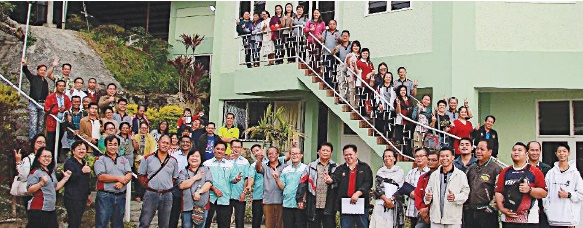Gathering for greater collaboration in the pastoral care of migrants
Parish human development committee members across the three arch/dioceses in Sabah participated in the training of trainers for migrant ministry Mar 2
Mar 23, 2018

By William Charles Mindus
Parish human development committee members across the three arch/dioceses in Sabah participated in the training of trainers for migrant ministry Mar 2-3.
The training at the retreat centre was organised by the Kota Kinabalu Archdiocesan Human Development Commission (AHDC).
The programme began with the Bible Enthronement by Fr Benedict Runsab and a recap on AMOS-3 and its action plan by Dominic Lim, coordinator of AHDC-KK.
The main session began with the presentation by magistrate Elsie Primus on the rights of migrant workers based on the East Malaysian Labour Ordinance. These include applicability of Employment Act 1955, Sabah Labour Ordinance [Cap.67 and 2004], Sarawak Labour Ordinance 1952, remuneration (salary and wages), leave, termination, women’s rights, child labour, complaint filing procedures, insurance coverage and other rights.
In addition, Primus also explained the importance of understanding and adhering to the Minimum Salary Directives 2016, the Employee Provident Act 1951 and Social Security Act (Perkeso), Employment Injury Scheme, Employment Insurance System, Occupational Safety and Health Act 1994 and Industrial Relationship Act 1967.
The Q&A after her talk touched on many issues cited by the participants, especially on the rights and duties of both the employee/labourer and employer, as most are unaware of the existence of the legal protection laws covering migrant labour employment.
The second session focused on the alternative approach to application of Birth Identification Documentation presented by Jellferlyne Joseph from Pusat Kebajikan Good Shepherd (PKGS).
Her talk was based on the Human Rights Declaration 1948 (Article 13: Rights for a Citizenship) and Convention of the Rights of Children (Article 7 and 8: Rights of children to have a Name and Citizenship) as enshrined by the United Nations and the steps taken by PKGS to assist migrant children (currently only available for Indonesian Migrants) in obtaining birth certificates through the assistance of the consulate office.
This will ensure that the children do not add towards the statistics of ‘stateless children’. On the humanitarian perspective, it would enable them to acquire proper education and the necessary skills for their future.
Franciscan Sr Anita Lintanga touched on pastoral approaches towards migrants including visiting, organising and networking with them. She quoted from Erga migrantes caritas Christi (Love of Christ towards Migrants). Citing Pope Francis’ message, the pastoral approach can be summed up in four words: welcoming, protecting, integrating and promoting the cause of migrants.
Before the training ended, Lim presented some of the follow-up actions which were identified, discussed and agreed upon in AMOS-3 and the 5th Triparte Pastoral Gathering at Ende, Flores, last October.
Among them were data on Indonesian migrants, migrants serving migrants as catechists, MoU with Flores dioceses, and the care of the third generation migrants. To carry out these, a team headed by Bishop Julius Gitom was set up on Feb 22, 2018 to spearhead and monitor the follow-up actions. The team comprises Human Development Commission members from the three arch/dioceses.







Total Comments:0